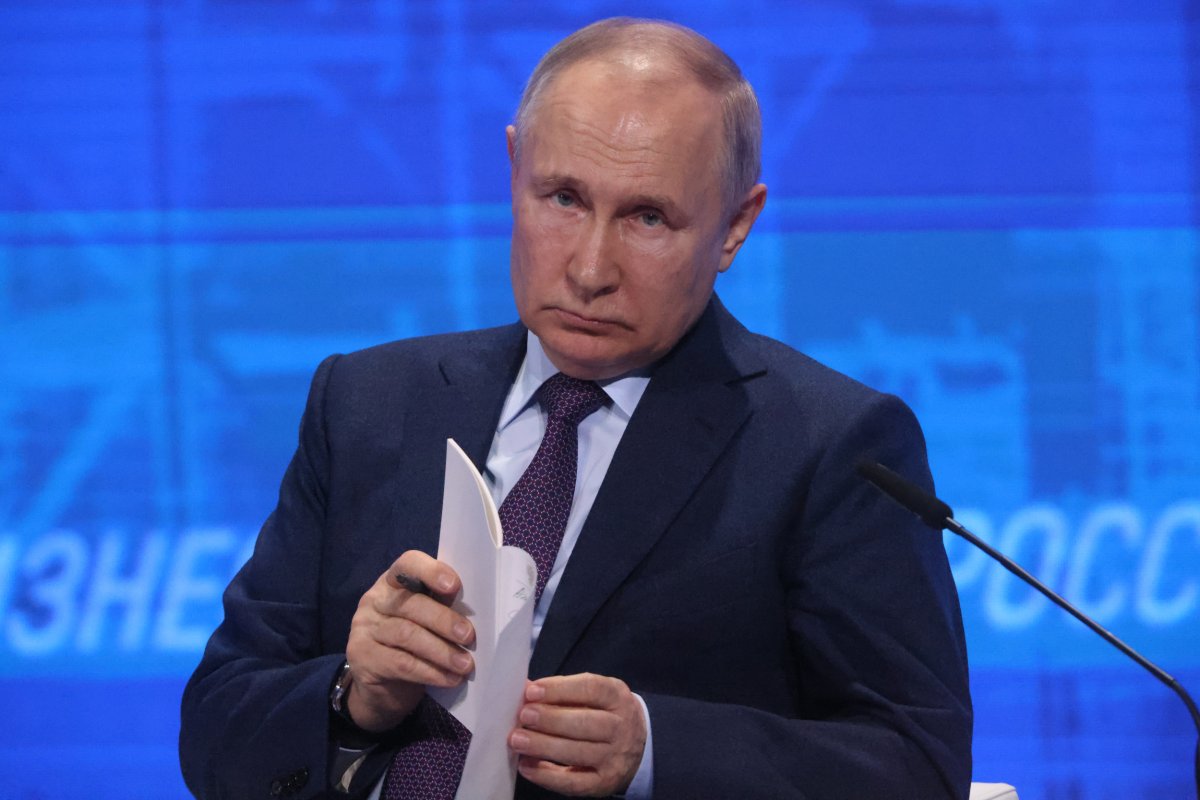- The International Criminal Court has issued an arrest warrant for Russian President Vladimir Putin in connection with an alleged war crime in Ukraine.
- The ICC does not have the authority to arrest suspects and Russia does not recognize the court or its jurisdiction, making a prosecution difficult.
- Proving "intent and knowledge" of such crimes can be challenging, and these types of prosecutions can take years.
The International Criminal Court (ICC) has issued an arrest warrant for Russian President Vladimir Putin in connection with his actions during the Ukraine war—the first international charges that have been brought since Russia invaded the neighboring country more than a year ago.
The ICC issued the warrant Friday, accusing Putin of being "allegedly responsible for the war crime of unlawful deportation of population (children) and that of unlawful transfer of population (children) from occupied areas of Ukraine to the Russian Federation."
A similar warrant was issued for Maria Alekseyevna Lvova-Belova, Russia's commissioner for children's rights, over her alleged involvement in the abduction of Ukrainian children and teenagers.
Investigators in The Hague have been gathering evidence against Putin over the past year, but an ICC prosecution remains a challenging task because Russia does not recognize the court or its jurisdiction, making a trial unlikely. Moscow also does not extradite its nationals.
At the same time, Ukraine is also not a member of the court. However, it has granted the ICC jurisdiction over its territory.
Speaking about Putin's arrest warrant, Eleonora Tafuro, a senior research fellow at the Russia, Caucasus and Central Asia Center at the Italian Institute for International Political Studies, told Newsweek, "Obviously, this is a symbolic decision."
She continued, "As long as [Putin] remains in Russia, he's safe, and frankly I don't see him traveling to Poland or other states that could enforce the arrest warrant and jail him."
Because the warrant's execution will depend on the states that are members of the ICC, countries that are not members will not be under those obligations. For example, if Putin visited China, the Chinese government is not obligated to arrest him, Leila Sadat, the special adviser on crimes against humanity for the ICC prosecutor, told Newsweek. Notably, Chinese President Xi Jinping will visit Moscow next week.

Still, "the decision [to issue an arrest warrant] sends a very powerful message: No one, not even the leader of a permanent U.N. Security Council member, is untouchable," Tafuro said.
The warrant doesn't mean Putin will be arrested immediately, Jordan Gans-Morse, the faculty director of Northwestern University's Russian, Eurasian and East European Studies Program, told Newsweek. But it is likely to have ramifications on Putin's foreign travel from now on.
"It might also affect the steps Russia ultimately will have to take to get sanctions removed, although much remains to be seen," Gans-Morse said.
ICC chief prosecutor Karim Kham, who has visited Ukraine four times since beginning his investigation a year ago, has previously indicated that abductions of Ukrainian minors were a priority for his team.
Last month, a report published by Conflict Observatory found that Russia systemically relocated at least 6,000 children since the beginning of the war, taking them to camps and facilities that used pro-Russia reeducation efforts on the kids. Conflict Observatory, which is supported by the State Department, is a program that tracks alleged war crimes in Ukraine. The report was done in partnership with Yale University's Humanitarian Research Lab.
The ICC investigation was launched during the early days of the war and has been focused on probing allegations of war crimes, crimes against humanity and genocide in Ukraine.
As defined by the United Nations, a war crime means "serious violations of the laws and customs applicable in international armed conflict," including intentional attacks on civilian populations, torture, hostage taking, rape and conscription of children, among other atrocities.
The ICC, which was established in 1998 by the Rome Statute, has jurisdiction in cases where individuals are charged with such crimes. Russia and Ukraine are omitted from the court's 123 members because while they signed the statute, they did not ratify it.
However, these types of prosecutions can take years and can be difficult to argue because not only do prosecutors have to establish a violation, they have to prove "intent and knowledge" of the crime.
In instances of crimes like targeting civilians, those facts could be hard to prove.
Despite the warrant, the ICC does not have the authority to arrest suspects and can only exercise its jurisdiction with the court's 123 members. Since Russia is not a member, the court cannot send authorities to arrest Putin within his country's territory. And since Russia does not extradite its nationals, and will be especially unlikely to do so with its president, Putin's arrest is not imminent.
Newsweek reached out by email to Russia's Ministry of Foreign Affairs for comment.
Update, 3/17/23, 2:53 p.m. ET: This story was updated with comments from Eleonora Tafuro.
Update, 3/17/23, 3:40 p.m. ET: This story was updated with comments from Leila Sadat and Jordan Gans-Morse.
Uncommon Knowledge
Newsweek is committed to challenging conventional wisdom and finding connections in the search for common ground.
Newsweek is committed to challenging conventional wisdom and finding connections in the search for common ground.
About the writer
Katherine Fung is a Newsweek reporter based in New York City. Her focus is reporting on U.S. and world politics. ... Read more
To read how Newsweek uses AI as a newsroom tool, Click here.








